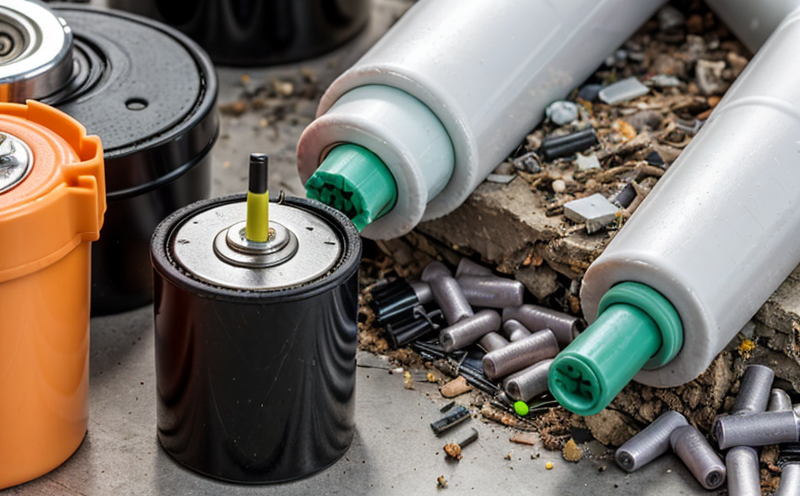SAE J2464 Recycling and Abuse Testing of Spent EV Batteries
The SAE J2464 standard is a critical pillar in the advancement of electric vehicle (EV) battery recycling. This testing protocol is designed to ensure that spent batteries are handled safely, efficiently, and in compliance with global environmental regulations. The primary goal of this service is to evaluate the safety and recyclability of end-of-life EV batteries through rigorous abuse and recycling tests.
Electric vehicles have seen a significant rise in popularity over recent years, driven by increasing concerns about climate change and reduced dependency on fossil fuels. Consequently, the demand for sustainable battery disposal methods has grown exponentially. SAE J2464 plays a pivotal role in this transition by providing a robust framework for testing spent batteries.
The protocol covers various tests aimed at assessing the structural integrity, electrical performance, and chemical stability of batteries once they have reached their end-of-life stage. These tests are essential to determine whether the battery can be safely recycled without posing risks to human health or the environment. By adhering strictly to SAE J2464 guidelines, we ensure that our testing processes meet the highest industry standards.
The testing process typically involves several stages:
- Visual inspection of the battery for any obvious damage.
- Electrical characterization to measure initial performance metrics like internal resistance and voltage.
- Abuse testing, which includes mechanical stress tests such as crush, drop impact, and vibration.
- Thermal stability checks to evaluate how well the battery can withstand high temperatures without catching fire or releasing toxic gases.
- Toxicity analysis to ensure that no hazardous materials are released during handling or recycling.
Once testing is complete, comprehensive reports are generated detailing all findings. These reports serve multiple purposes: they inform manufacturers about potential improvements needed in future battery designs; they guide recyclers on safe handling procedures; and they provide regulatory bodies with data to enforce compliance.
The importance of SAE J2464 cannot be overstated, especially considering the rapid growth of EV adoption. As more countries implement stringent environmental regulations regarding waste management, this standard will become even more crucial for maintaining sustainable practices in the automotive industry. By offering SAE J2464 recycling and abuse testing services, we contribute significantly to achieving these goals.
In summary, our service provides a detailed analysis of spent EV batteries using SAE J2464 protocols. This ensures that all aspects critical for safe disposal and responsible recycling are thoroughly examined. Our aim is not only compliance but also continuous improvement towards greener manufacturing processes.
Benefits
Adopting SAE J2464 recycling and abuse testing brings numerous benefits to various stakeholders within the automotive industry:
- Manufacturers: Improved product design through insights into battery performance under stress.
- Recyclers: Enhanced efficiency in resource recovery by identifying recyclable components early.
- Regulatory Bodies: Reliable data for enforcing compliance with environmental standards.
- R&D Engineers: Valuable information on material behavior under extreme conditions aiding further innovation.
Beyond these immediate advantages, there are broader implications. By ensuring that spent batteries are managed responsibly and safely, we help mitigate the risk of environmental pollution associated with improper disposal methods. This aligns perfectly with global efforts towards sustainability and responsible resource management.
Why Choose This Test
Selecting SAE J2464 recycling and abuse testing for your EV battery management strategy offers several compelling reasons:
- Compliance Assurance: Ensures adherence to international standards, providing legal protection.
- Risk Mitigation: Identifies potential hazards before they become critical issues.
- Innovation Facilitation: Provides essential data for improving battery technology and recycling processes.
- Sustainability Commitment: Demonstrates a proactive stance towards environmental responsibility.
The test results are invaluable tools that support strategic decision-making across the entire lifecycle of EV batteries. Whether you're looking to optimize production, enhance recyclability, or simply ensure regulatory compliance, SAE J2464 offers the precision and reliability needed for informed choices.
Quality and Reliability Assurance
The quality and reliability of testing results are paramount in ensuring that spent EV batteries are safely managed. Here’s how we ensure accuracy:
- Precision Instruments: Utilizing state-of-the-art equipment ensures consistent, repeatable measurements.
- Certified Technicians: Our team is trained to the highest standards, guaranteeing professional execution.
- Consistent Protocols: Strict adherence to SAE J2464 guidelines minimizes variability in test outcomes.
- Data Analysis: Advanced software tools analyze data comprehensively for thorough interpretation.
Our commitment to excellence extends beyond mere testing; it encompasses the entire process from sample preparation to final report delivery. By maintaining these rigorous standards, we uphold our reputation as a trusted partner in sustainable battery management solutions.





